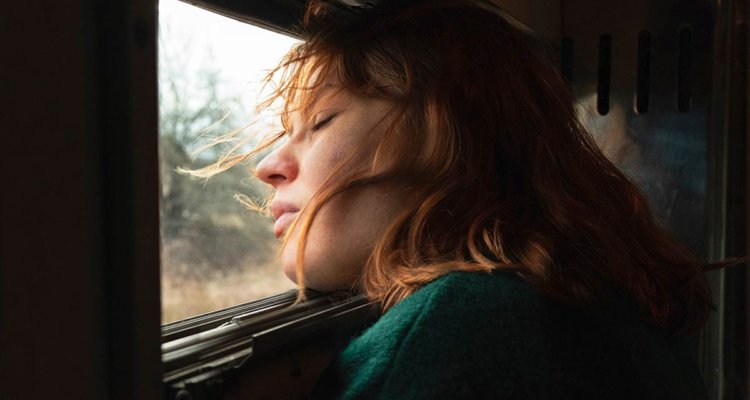Cinema’s love affair with trains goes back, of course, to the very origins of the art form, and more than a century later, the flame shows no sign of dimming. To recent examples such as “Snowpiercer” (2013), “Train to Busan” (2016), and the latest of many adaptations of “Murder on the Orient Express” (2017) can now be added “Compartment no.6” (“Hytti Nro 6”) from Finnish director Juho Kuosmanen, premiering in Competition at this year’s Festival de Cannes.
READ MORE: Cannes Film Festival 2021 Preview: 25 Films To Watch
On a train, every passenger is essentially an outsider among people of all kinds, classes, and backgrounds, each one of them alone, together. But even before she gets on the overnight ride from Moscow to Murmansk, Laura (Seidi Haarla) does not fit in, and not just because she is Finnish. The film begins on the evening before the planned trip, as the smiley but seemingly shy young woman attends one last party at the flat of her beloved Irina (Dinara Drukarova). At the almost bohemian gathering of artists and intellectuals, Irina is beaming from the attention of her guests and delights in quizzing her elegant friends on literature, the subject she teaches at university. Laura tries to participate, but it is clear she simply isn’t of that world: she hasn’t read enough books, she doesn’t have the required fashion sense, and most of all, she cares about Irina too much. She leaves in the morning unsteady and worried about how what was supposed to be a romantic journey into the arctic for the two lovers has somehow turned into her leaving behind the city she has grown to love.
In her second-class bunk compartment, she initially does all she can to stay away from the other passenger she is sharing it with, a young blue-eyed Russian who drinks too much and asks too many questions. At this point, nothing suggests that these two very different people might ever be anything other than more-or-less polite strangers. But as Richard Linklater already showed in “Before Sunrise,” train journeys have a way of bringing people together. Kuosmanen takes a more realistic, less romantic approach to the build-up of this relationship than the American director did with Celine and Jesse. Laura’s change of perspective about her neighbor occurs through dozens of tiny inflections of emotion that have more to do with her and the person she decides to be than with anything Ljoha (Yuriy Borisov) says or does.
READ MORE: Summer 2021 Preview: Over 50 Movies To Watch
Laura begins “Compartment no.6” (“Hytti Nro 6”) in an almost eerily undetermined state, and director of photography J-P Passi captures all the loneliness and anxiety of a person utterly at sea. She seems even more of a blur when she meets Ljoha, who, by contrast, initially appears to fit all the cliches about brash-talking, vodka-drinking Russian men. Later on in the film, a lost Finnish tourist whom Laura lets stay in their car for a few stops remarks about her bunk companion, “there must be a factory that makes guys like him somewhere.” That this (very rude) stranger himself appears to be the cliche of the annoyingly self-involved, “sensitive” guitar-strumming guy at a party is no coincidence: “Compartment No.6” is at its best when it unveils the gap between its characters’ true identities and the parts that they choose to play.
READ MORE: The 100 Most Anticipated Films Of 2021
As Laura and Ljoha cautiously circle each other, Kuosmanen gives them enough time for their humanity to shine through from behind their masks. Although Laura’s facade never really fits her in the first place, Ljoha’s is more firmly attached, and the film’s most interesting moments occur when each is confronted with that of the other. Laura’s state of indetermination is one she can afford: she is an educated university student, going to Murmansk to look at petroglyphs for no good reason (because Irina wanted to). Ljoha, on the other hand, is going there to work in a mine. We see very little of his daily life off the tracks, but we know that he knows how to steal and kickstart a car without keys and that he can negotiate his way into anything. While Laura tried to act like a cultured intellectual for a while then essentially abandoned the idea, Wearing a tough guy mask is, for Ljoha, a matter of survival — he has no choice in the matter. In the small space of compartment no. 6, the only thing left to separate the two passengers is a difference of class.
READ MORE: The 25 Best Films Of 2020 You Didn’t See
But the long train ride offers plenty of opportunities to at least momentarily ignore these mental prisons, and the many scenes of Laura and Ljoha simply enjoying each other’s company, poking fun at one another, or running together in the snow, have a genuinely exuberant quality. During one particularly joyful scene, Ljoha mentions “Titanic” (helping to place the story sometimes in the late 1990s, after the release of James Cameron’s box office smash but before the ubiquity of mobile phones). Besides the possibility of freezing to death, the two films also share the conceit of an exhilarating, if transitory, escape from class difference.
Like “Titanic,” however, Kuosmanen’s film tilts into less convincing territory in its attempts to impose romance no matter what. The relationship should continue after the train arrives at the station is an almost irresistibly romantic proposition for the audience, and Kuosmanen ends the film with the future of the romance looking positive, if somewhat ambiguous. But even the mere possibility of it makes the film and its characters ring a lot less true — there is a reason Leo dies, after all. [B]
Follow along with our complete coverage from the 2021 Cannes Film Festival here.

